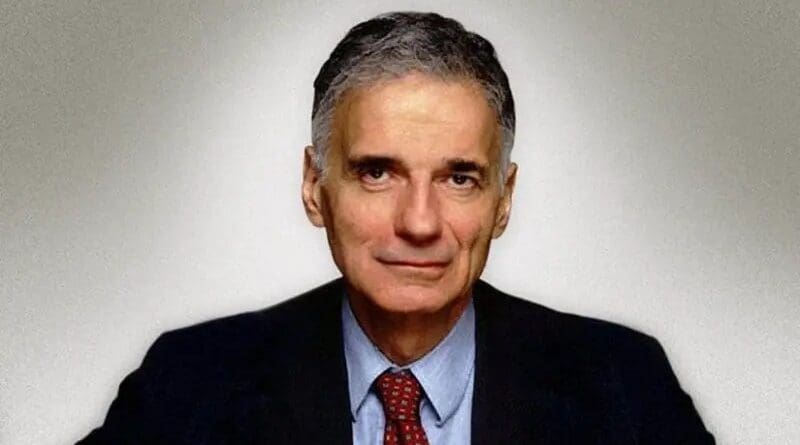Ralph Nader: Good News, Big Opportunities On The Horizon – OpEd
By Ralph Nader
In the midst of so much bad news in the media, it is always good to be alert to rays of sunlight that civic action can build upon.
First, let’s start with the sun, which is receiving increased respect these days by Earthlings. Various forms of solar energy – thermal, photovoltaic, wind, and passive (architecture) are winning the price competition against new fossil and nuclear fuels by large and growing margins around the world. The oil, gas, coal and nuclear lobbies, unable to compete on economics, resort to government subsidies, bailouts, tax breaks and propaganda to entrench themselves and their omnicidal products. People, however, including Texans, are warming to solar, and its decentralized, local nature and the need to invest in expanding, facilitative grid systems. Large majorities in opinion polls now want a solarized country.
Second, smart, focused labor strikes are underway with polls showing majorities in our country supporting labor unions. Between seventy and eighty percent of non-unionized workers want to join one.
The Writers Guild of America strike has been settled in the entertainment business to the approval of most of the rank and file. The massively overpaid CEOs in this industry were forced to pay attention to labor negotiators’ priorities, including some protections from the use of robots (AI), adequate staffing, and better pay and working conditions. Now it’s the turn of the much more numerous striking actors to make sure their long-overdue grievances are addressed by the opposing CEOs.
Under Shawn Fain, the United Automobile Workers Union has commenced selective strikes against the major unionized auto companies. Fain is framing very well the class exploitation issues and the necessity to end the concessions imposed on the workers both before and after the huge $30-plus billion-dollar federal bailout, under President Barack Obama, of the grossly mismanaged General Motors in 2009.
Fain points to the huge, unprecedented gap between the over $14,000 an hour in pay that GM CEO Mary Barra receives, plus benefits and perks, and that $18 to $22 per hour paid to the lower-tier UAW members – a discriminatory system against young workers, dividing them from the older auto workers (making about $33 per hour) that Fain wants to eliminate. Equal pay for equal work on the factory floor. The revived union is also driving a fairer policy to head off an AI displacement threat which could disempower workers by requiring them to train the robots that will take their jobs.
Third, retiring Chairman of the Joint Chiefs of Staff, General Mark A. Milley told an audience in New York that Russia and Ukraine must realize that victory may not be “achievable through military means,” drawing a comparison with World War I that dragged on and set the stage for World War II. Milley, a Princeton graduate with advanced degrees in international and military history studies, advised: “Things can get worse, so when there’s an opportunity to negotiate when peace can be achieved, seize it . . . Seize the moment!”
Those who are waging peace to overcome this and other armed conflicts hope that retired General Milley will speak out vigorously, with other retired high-ranking officers, about the need for peace negotiations and immediate unconditional ceasefires. They have credibility when they advocate for peace.
It may surprise many people that the civilians in the Pentagon and in Congress have been far more belligerent than the “military” regarding wars in Afghanistan, Iraq, Libya and elsewhere. They have to answer the question: “What’s our plan right after we invade and occupy?” Their civilian counterparts, with no military experience, have no such perceived responsibilities. We hope Mark Milley does not get enveloped in a lucrative consulting or executive position in one of the giant manufacturers of weapons of mass destruction. Extra discretionary income is trivial compared to being a strong public voice for peace and avoiding escalating wars.
Fourth. The tagline of the many full-page Bank of America ads that have been running in the Washington Post presents an opportunity to awaken bank customers. The Bank tantalizingly asks potential customers: “What Would You Like the Power to Do?”
Well, for starters, bank employees could simply return telephone calls from depositors and borrowers and not make customers call again and again their bank branch, where the only option is to leave voicemail messages that go unanswered for days or weeks at a time. Also, how about customers wanting the power to stop the Bank of America from cheating or faking accounts? A few weeks ago, the Consumer Financial Protection Bureau (CFPB) and Office of the Comptroller of the Currency (OCC) fined the Bank of America $250 million charging that the bank “systematically double-charged customers fees, withheld promised credit card perks, and opened accounts without customer authorization.” (https://www.reuters.com/business/finance/us-regulators-fine-bank-america-over-junk-fees-cfpb-2023-07-11/).
Or how about giving your bank company savers the highest current interest rate for their kind of account? Many people, including the elderly, unknowingly have their savings stuck in savings accounts with a fraction of 1 percent interest, despite the Federal Reserve raising rates to the 5 percent range. Don’t banks have fiduciary relationships with their clients? There are tens of billions of dollars at stake in these “dormant” savings accounts (not CDs) in financial institutions throughout the U.S.
One harbors hope that Consumer Reports and the Consumer Federation of America will move to alert millions of Americans to ask for their bank’s highest available interest rates on their savings.
Finally, at long last, the Federal Trade Commission and seventeen states filed a comprehensive antitrust suit against giant Amazon, charging unlawful, anti-competitive practices against the online merchant. Big stakes here for consumers, as well.
Make your voices heard on these and other important matters.

